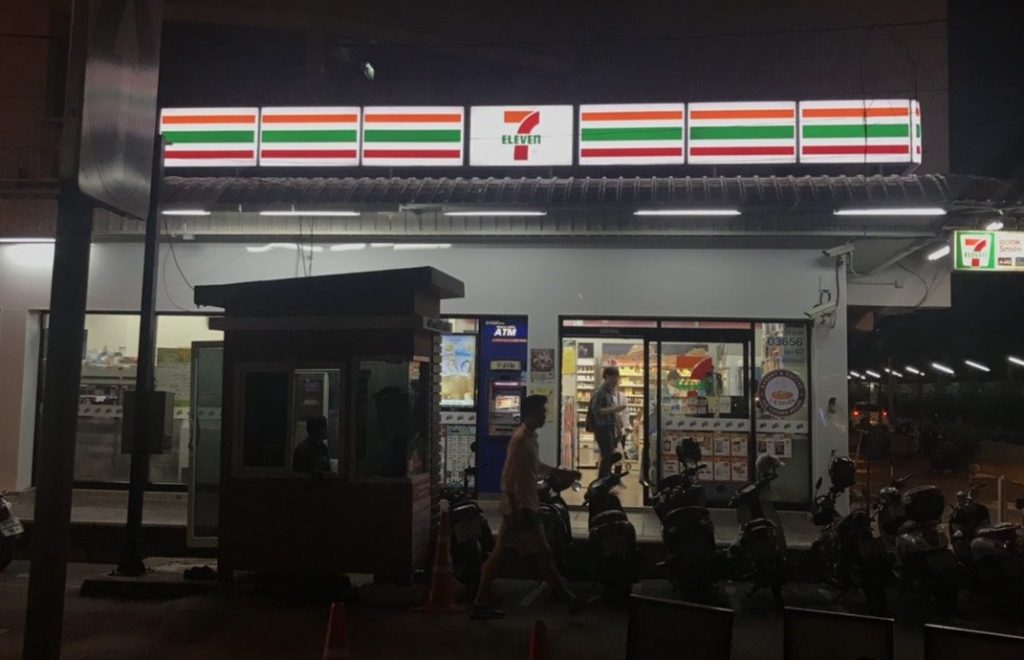Cover Photo: Samyan Mitrtown, author’s photo
Volume 3, Number 1: October 2019 | Article
Thailand is no stranger to businesses operating at late hours. The ‘night life’ experience is considered as a tourist attraction and those looking to have a good time. However, there are businesses that operate beyond those late hours in Thailand. Large multinational chain stores like McDonald’s and Starbucks have been using the 24/7 model in most of their stores for years. Furthermore, Thailand is the country with the second most 7-Eleven in the world, only behind Japan. Clearly, the transition to these open-all-hours businesses is not new in Thailand and has in fact already started long ago.
As these businesses expand their operations, it is important to consider its impact on urban life. Having an established location available at all times is the selling point of 24/7 stores. These stores provide much more convenience for people within the vicinity of them as it provides a place for anything they need at any time. An example of this are convenience stores like 7- Eleven. In total, there are more than 10,500 individual 7-elevens all over Thailand, the majority of which are opened 24/7, all year round. I have lived my entire life with the luxury of convenience stores as I find myself needing a late-night snack. This is even more prevalent as I entered university. This is also the case for those staying up at late hours: office workers working overtime, truck drivers delivering products throughout the night, and those working night-shifts. It is impossible to deny that life for consumers has risen as they can choose to consume at any time.
However, there is another side to consider, the workers. These stores, at least currently, are staffed with human workers behind the counter. Those that have to supervise these stores will have to be awake in the irregulars between 10 pm to 6 am, outside of the usual working hours found in normal working places. There are many impacts on those workers as a consequence of working those late hours. Biologically, our bodies have rhythmic genes that are synced with our sleep schedule. Disrupting that sleep cycle will cause damaging effects on the body. This is unavoidable as these workers will have to convert to an irregular sleep cycle constraint by their work schedules.

Furthermore, even if they manage to shift their sleep schedule, that would instead disrupt their social lives within those regular hours. The Independent has an article retelling the case of a married couple affected as the husband is working the night shift. The article highlights how the couple will have to plan weeks in advance just to attend social events that require the husband to take time off work and readjust his sleep schedule. Imagine this example applied to all the workers employed at the 10,000+ 7-Elevens all over Thailand.
Due to these implications, it is possible that the night shift is paid a premium in order to compensate for the inconvenience. However, it is impossible to tell whether the premium paid is enough to cover the social costs or even if there was such an amount. The problem this could bring is attracting those who are desperate, so much so that they are willing to forgo this inconvenience simply because they have no other choice. It is undeniable that this trend is providing jobs, however, it is also important to consider the conditions those workers will have to go through.
For the corporate side, the concern comes down to whether operating 24/7 is worth the additional costs. Increasing hours will raise staffing costs, operating costs, and will require more planning for logistics. The majority of the country operate at regular hours, working 9 to 5, studying from 8 am to 4 pm or just awake between the period from 10 am to 10 pm. Yet, there must be demand for them if these convenience stores are still around and thriving today.
The question is whether their benefits truly justify the costs. For corporate, it’s the increase in the cost of operating these stores and if they are still opened then they might be worth it. On the other hand, the workers are facing huge social, health and psychological costs from taking these jobs. Worse, it may be primarily targeting those who are truly desperate with no other options. It is undeniable that the consumers benefit from them but at what cost? Whether or not the trend of night shifts should be supported relies on these questions.
References
- 7-Eleven. Home. https://corp.7-eleven.com/corp/home
- Samyan Mitrtown. About Us. https://www.samyan-mitrtown.com/About-Us
- Usbourne, S. (2015). Britain’s 24-hour culture: With the ‘leisured society’ a distant dream we’re working longer and less regular hours than ever. The Independent. https://www.independent.co.uk/news/uk/home-news/britains-24-hour-culture-with-the-leisured-society-a-distant-dream-were-working-longer-and-less-10485410.html
- Withnall, A. (2014). Working Night Shifts ‘Sends Body Into Chaos’ and Could Cause Lasting Damage to Health. The Independent. https://www.independent.co.uk/life-style/health-and-families/health-news/working-night-shifts-sends-body-into-chaos-and-could-cause-lasting-damage-to-health-9074052.html












































The author tells another inspiring side of 24/7 model which is ‘Urban Life Library’ concept instead of the usual 24/7 retail stores and tourist attractions. The author chooses the well-known examples of 24/7 stores such as Mcdonald’s, Starbucks, and 7-eleven to begin with so others can see the big picture of this chain clearly. Impacts of 24/7 model on urban life in both beneficial and unfavorable ways have been analyzed thoroughly also examples of them are quite practical in our daily life. Benefit and cost of this night life are evaluated for both worker and corporate sides. Also, question at the end of an article leaves a questionable thought for readers to rethink about it. Moreover, agglomeration effects on this 24/7 model can be discussed a little bit more. It is a pleasure reading this article; it is so enjoyable and interesting because it fits with our daily life. There might be some sides of this night life that we didn’t even consider it before. Also, I can say that article is easy to read and catch up.
This article give a very clear view on both cost and benefits side of 24/7 kind of businesses which booming in Thailand right now. The most familiar kind of 24/7 businesses stated in the article such as, convenience stores or chained stores such as, McDonald or Starbucks offer more convenience night life for those late night workers. Moreover, the businesses that become more popular in center Bangkok (especially around University) as I have seen in this recent year, is 24/7 co-working space businesses.
The view that I would like to discuss apart from what already discussed in this article is the social cost of this kind of businesses in view of sustainability. Besides corporate cost added and health issues caused by late night working routine, the loss in sustainability of environmental and energy should be concerned as social cost contributed from this kind of business too. Most of 24/7 stores tend to be busy during day time to about midnight comparing to the time after midnight to early morning. There’re many question that should be raised looking at the social cost that lies behind the convenience provided by these 24/7 businesses. Is it sustainable to sacrifice more energy use from air conditions, electricity etc. to just serve much smaller amount of customers comparing to daytime? Is it sustain to future of our society of limited resources and what will this consequences effect next generation life? Is it fair that we sacrifices these resources to meets our demands in the short terms?
The author describes the advantages and disadvantages of the 24/7 model very well. You just have to ask yourself, do you really have to go shopping at 2 a.m. at night? Do you need a supermarket open for midnight snacks at this time of day? On the one hand, I like the idea that in places where there is a big nightlife, a shop is open 24/7. But on the other hand you don’t need this all over Thailand. In many Asian countries it is also common to learn deep into the night, where a 24/7 cafe is just right for the students. In my home country, Germany, this is inconceivable, the latest closing time in supermarkets is 12 pm, for clothing shops and shopping malls mostly between 8 pm and 10 pm. In my opinion there should not be 24/7 shops all over Thailand, but only in places where it is really needed.
24/7 opening hours are a highly interesting topic to me since the non-existence of these present an issue in my city of residence. Just as Romy, I am also from Germany. However, living in the state of Bavaria I face even stricter opening hours than in her hometown Stuttgart: The supermarkets and stores are obligated to close at 8 PM. During my internship in Munich I was working full-time and it was nearly impossible for me to do proper grocery shopping on weekdays. Our globalized environment is demolishing the borders of time. We are increasingly expected to work in more flexible hours than the usual nine to five job. In order to fulfill these tasks, we might need a surrounding that changes with us in the same pattern. Do we need to slow down? Or do we just need to get used to splitting up our society in day-workers and night-workers? And what about criminality, will I feel secure to walk to the grocery store in the middle of the night?
An interesting topic. I agree with you and Piyanun that the hiring of employee at night can worsen the health of these staffs and affects the sleep in which the cost of operating, managing, dealing with the efficiency of resources’ uses such as electricity or land areas or the sustainability concern of opening a 24 hours shop needed to be looked and analyzed.
From my perspectives, the 24/7 model of 7-elevens throughout Thailand or at least nearly every corner of the streets could be a sign of replacing local groceries stores. It is important to see how these stores have taken over local shops and is it worthy to construct more 7-elevens by using the reason of hiring more employees? For me, the rate of hiring 7-elevens staffs might not compensate the loose of jobs such as local vendors in the market. We need to consider employment multiplier effect whether the local people are getting benefit or not.
I think there should be an urban planning or some restrictions on the number of retail stores in each district or some distances in order to constrain the multiple popping of 7-elevens. 7-elevens can exist such as in Mitrtown, but there should be a support for the local market where you could still buy ingredients, food at least in the afternoon. Because the income from the operation of 7-elevens will be in the pocket those owners of each branch or its home country, where only little income or employment such as part-time jobs were created. These employees who receive low income could create small multiplier effect to the society or may be spent its expenditures in those 7-elevens itself. If jobs are likely to displaced and if consumer shifts their consumption to rely on 7-elevens, this convenient store is possible to be a single seller that put pressure on wages and extract the wealth from people without circulating it in the society.
Therefore, the benefit and drawbacks on the opening of 7-elevens, local multiplier effect or export employment could be discussed. Whether the profit and employment of these 24/7 stores model stays in local people rather than disturbing local markets or not can be added in this writing.